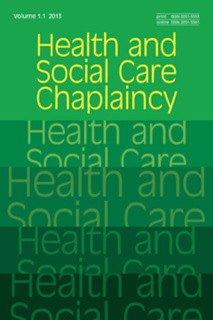Latest Issue
The latest issue of Health and Social Care Chaplaincy (HSCC) carries a broad range of topics. These topics include: the exploration of cognitive science in religion-informed spiritual care, the role of chaplaincy in an interprofessional neuropalliative outpatient team, a taxonomic approach for introducing spiritual care in healthcare settings, a peer-to-peer staff listening service for acute contexts, the indirect effects of prayer on stress and life satisfaction for participants in Alcoholics Anonymous and finally the moral reorientations of healthcare chaplains during the COVID-19 pandemic. There are also several book reviews discussing LGBTQIA inclusive hospice spiritual care, mental health and Christian spirituality, and finally, creating a sacred space for story, reflection and practice in healthcare chaplaincy. The subject matter experts of these diverse topics come from numerous countries, namely, England, Ireland, Germany, Estonia, Netherlands, Poland and the United States. The editorial concludes by noting information about the inaugural Australian and New Zealand Moral Injury Conference (ANZMIC 2026)


